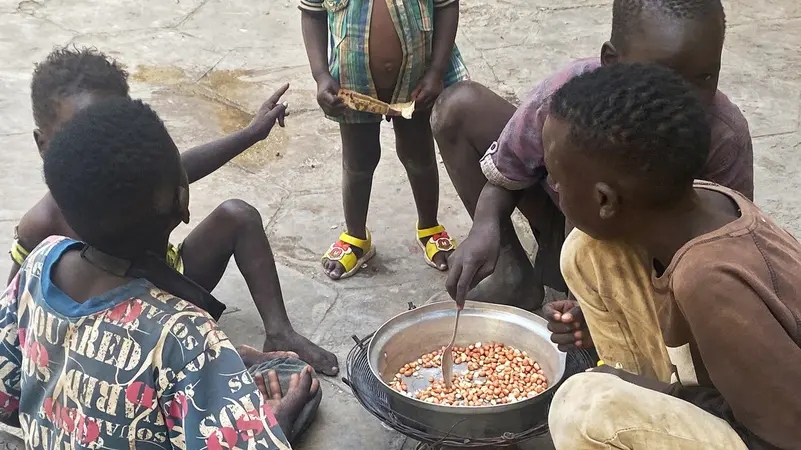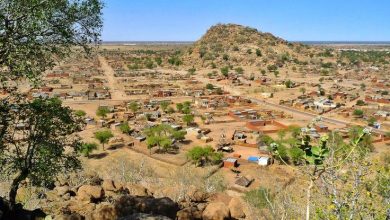Hunger Ravages Sudanese People as Slow Death Spreads to 17 Regions
Mashawir – Agencies

Since the outbreak of war between the Sudanese army and the Rapid Support Forces (RSF) in mid-April 2023, a severe humanitarian crisis—one of the worst in the world—has emerged. More than half of Sudan’s 45 million people are now suffering from extreme hunger and are in desperate need of life-saving humanitarian aid. The crisis is most severe in regions already hit by repeated food and medicine shortages, such as Darfur, Kordofan, and the capital Khartoum, as waves of displaced people flee fierce fighting. Hundreds have already died of starvation, while hunger-related diseases are spreading widely—especially among children, the elderly, and pregnant and nursing women.
This tragic situation has created a huge gap in humanitarian needs, while aid efforts continue to face major obstacles, most notably the obstruction of UN humanitarian agencies trying to reach those affected.
Normally, the Humanitarian Aid Commission (HAC) would manage the delivery of relief to save millions from slow death caused by famine. However, interference from other actors has weakened these efforts. Although Sudan has received more than 250,000 metric tons of relief supplies through Port Sudan and the Adré border crossing with Chad, suspicions of corruption, irregularities, and mismanagement have clouded these operations, opening the door to aid diversion and manipulation.
As food security worsens, the Famine Review Committee (IPC) confirmed that famine conditions (Phase 5) have been present since July 2024 in areas such as Zamzam Camp in North Darfur. Between December 2024 and May 2025, famine spread to five more areas, including Umm Kaddada, Mellit, and El-Fasher, and now threatens 17 regions across the country.
According to UNICEF, one child dies every two hours from malnutrition in Zamzam Camp, with about 24 million children affected by the war and 730,000 suffering from severe acute malnutrition.
This reality proves that famine is not a natural disaster—it is a man-made crisis, resulting from the deliberate obstruction of humanitarian access, making starvation a weapon of war and a sustained conflict strategy.
Displacement Wave
The Sudanese government stated earlier that its policy is to ensure aid reaches all civilians without religious, ethnic, or political discrimination. It said it had opened routes, corridors, and airports for humanitarian access, including some areas outside its control, such as the Adré crossing.
According to Sadiq Ismail, Adviser for Humanitarian Affairs, the most urgently affected areas are North Darfur and South Kordofan, where people desperately need food and medicine. He urged aid organizations to deliver assistance after the government opened access routes, adding that an emergency committee was formed to facilitate aid delivery across all states.
Later, Salwa Adam Benya, Commissioner of the Humanitarian Aid Commission, revealed that displacement has surged in conflict zones, reaching 1,300,645 displaced people. Around 515,000 fled Zamzam Camp to El-Fasher, and 48,600 fled Abu Shouk Camp to Tawila, while others moved toward Tine, Chad.
In West Kordofan, over 200,000 people have been displaced, including 75,000 to Wad Al-Hilu and 18,750 from Abu Mareka, while 70,000 fled from Al-Khowei to Al-Joudi. In North Kordofan, 90,000 displaced people fled Kazfil to El-Obeid, 53,000 from Bara, and 110,000 from the Jumu’iyya area near Omdurman.
Benya said the need for humanitarian aid is now critical, adding that the government opened 12 aid corridors, but only four are in use—Adré and Tine in Darfur, and Argeen and Ashkeet in the north. Despite this, relief convoys are still not reaching El-Fasher or nearby camps.
She also complained that some aid trucks were redirected from their original destinations, hindering distribution. The government plans to set new regulations to ease humanitarian operations and protect aid workers, stressing that there are no obstacles to access in areas controlled by the army.
Queues and Starvation
Musa Abdulrahman, a resident of Al-Kalakla in southern Khartoum, said:
> “Getting food has become a daily struggle, especially for those who were already poor. Many have run out of savings and rely on charity kitchens that have now shut down. When aid arrives, only registered families receive it, and most return home empty-handed, filled with despair and hunger.”
He added that rising food prices and lack of access to aid have worsened hunger in the capital:
> “We know that tons of aid have arrived from various countries and organizations. If distributed fairly, it could end hunger and malnutrition, especially among children, the elderly, and pregnant women.”
Control of Aid
In Darfur, volunteer community kitchens in El-Fasher have stopped serving meals due to food shortages and insecurity.
Volunteer Ahmed Shogar explained:
> “Those who remain in El-Fasher are suffering due to the lack of food, as humanitarian aid can’t get in because the RSF controls the border crossings.”
He stressed that humanitarian aid should remain neutral, but warring parties have weaponized hunger by blocking food, medicine, and shelter, which is a blatant violation of international humanitarian law and constitutes a war crime.
Shogar added that both sides’ control of supply routes has directly contributed to famine, turning aid into a tool of punishment. The destruction of agricultural infrastructure and the looting of major companies have left people dependent on external aid, meaning that blocking it could prolong famine for years.
Hunger and Disease
Mariam Abdelkarim, a 43-year-old displaced mother of five, said:
> “My children are starving. We haven’t lit a fire in our small kitchen for a long time because we have nothing to cook. Families line up daily for a small portion of lentils, and my children have developed malnutrition.”
She added:
> “Thousands of families are in the same situation. Despite massive aid shipments, little reaches us. People have resorted to eating tree leaves, animal feed, and even dead animals, leading to poisoning and bloating—especially among children.”
Fears and Tragedies
Humanitarian researcher Mahdi Yousif explained that the main obstacle to aid delivery lies in the warring parties’ fear that it could be used to smuggle weapons. However, he emphasized that delivering aid is essential to reduce hunger levels, which have now spread even to relatively safe areas.
He added that UN and NGO reports have placed a moral responsibility on the international community, which has remained largely silent despite the worsening famine.
Yousif noted that the Sudanese army recently managed to airdrop food and ammunition to its troops in El-Fasher after failing to secure ground access due to the RSF siege. However, this move sparked criticism, as it excluded civilians, who are the ones most in need of food.




